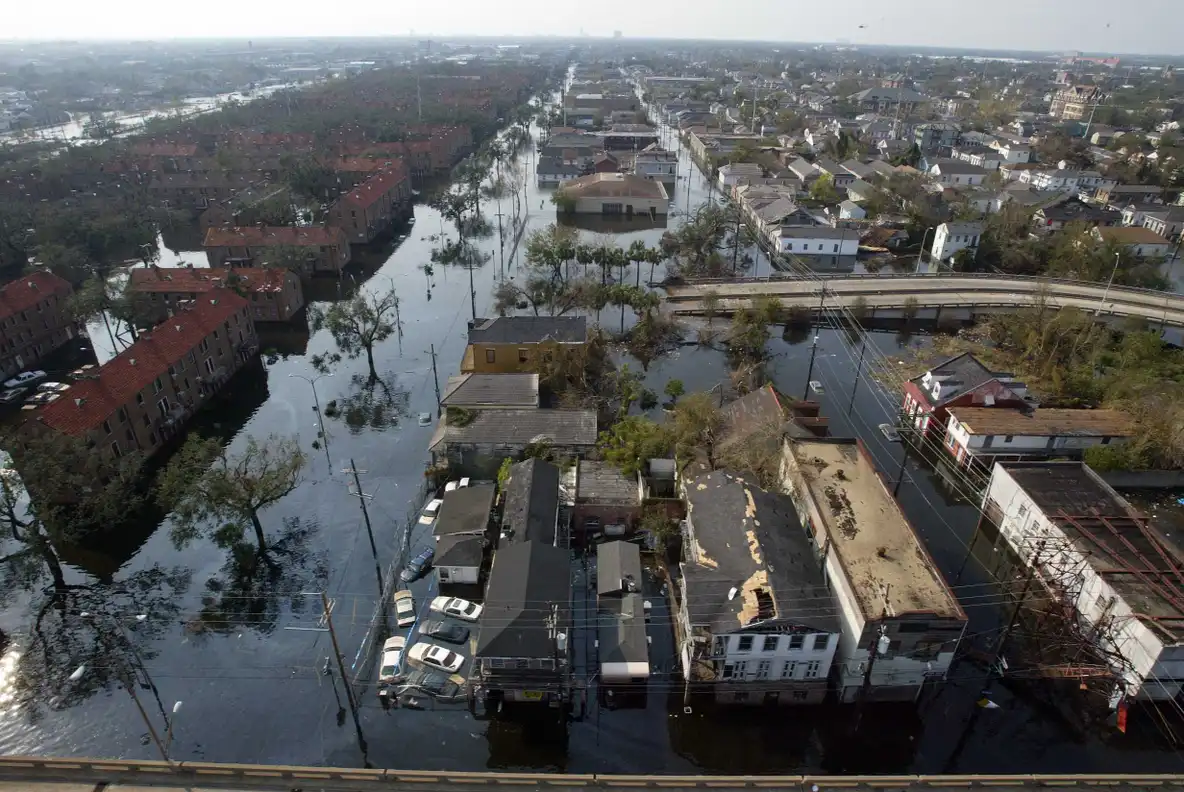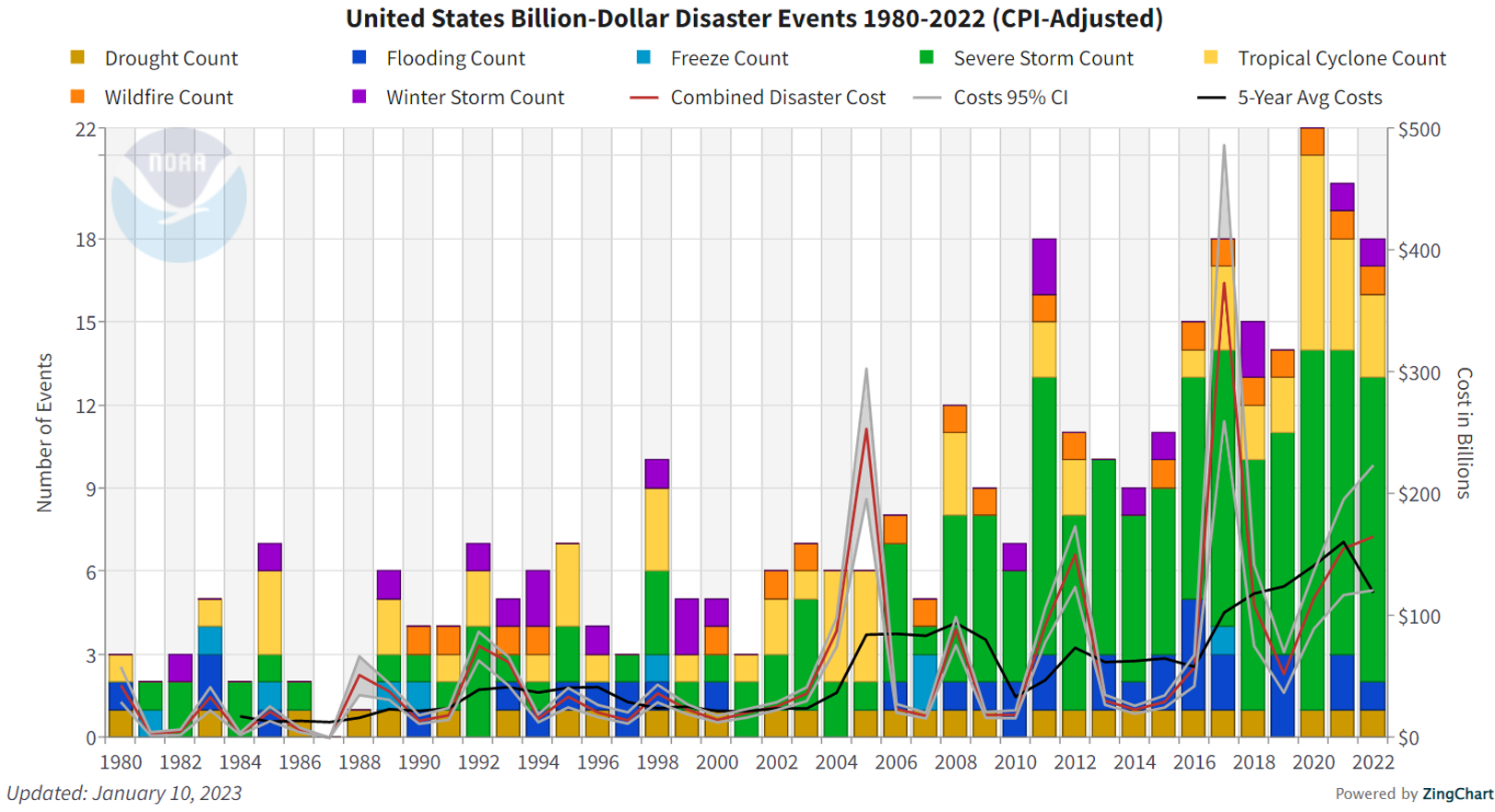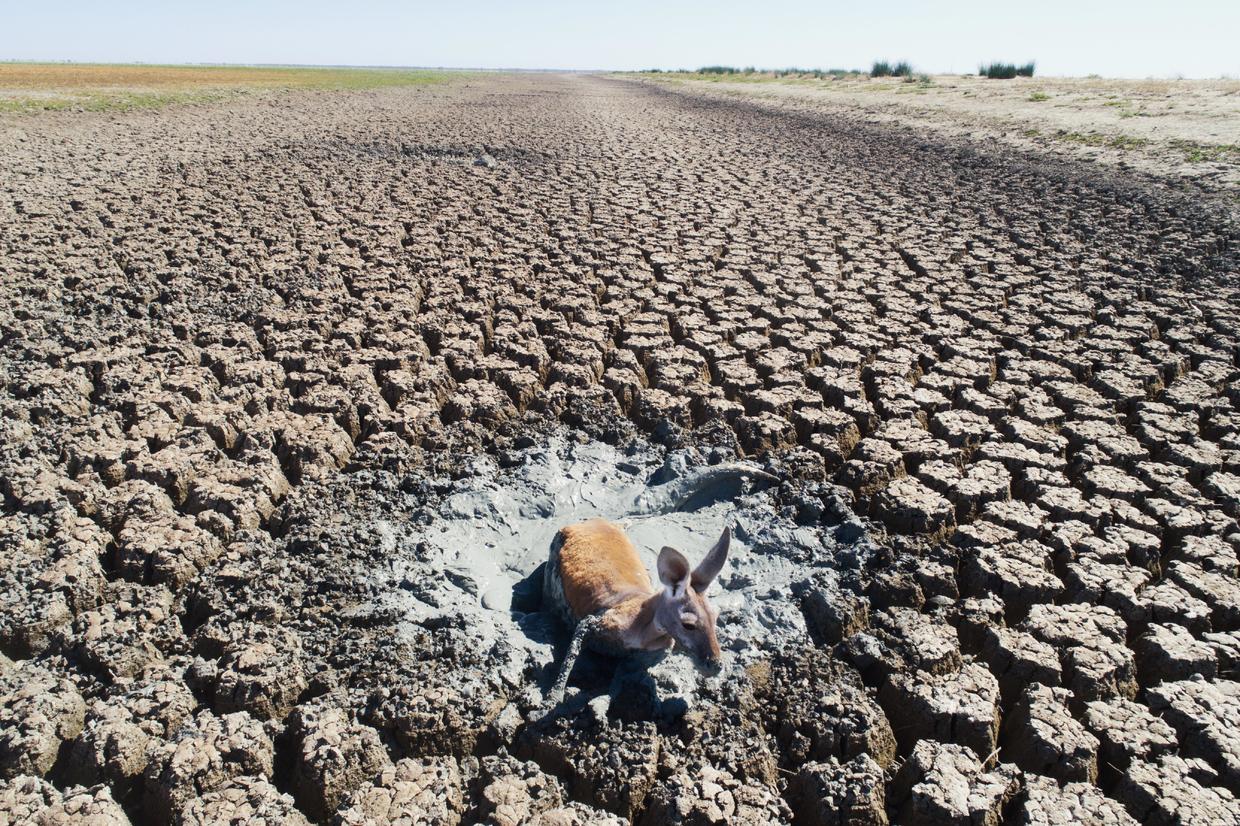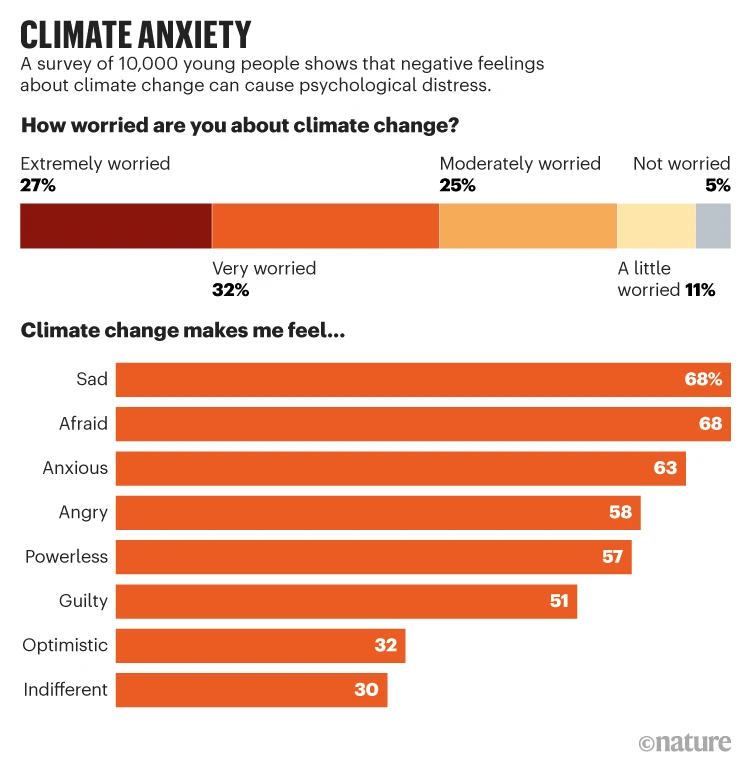What is happening?
- Mental health issues including post-traumatic stress disorder (PTSD), depression, anxiety, and others are prevalent among those who have directly experienced climate-related events. Devastating extreme weather events like hurricanes, floods, and wildfires can take lives, destroy homes, and displace entire communities. In the aftermath of destruction, many victims are left with intense feelings of grief, hopelessness, and panic. Some develop diagnosable psychological health conditions as a result of their trauma.
- A study conducted by the American Journal of Orthopsychiatry in 2012 concluded that rates of mental illnesses in directly impacted communities doubled in the aftermath of Hurricane Katrina in 2005 (image below). Depending on the individual, these mental health effects could last anywhere from weeks to years. Another study on the effects of Hurricane Katrina found that a sixth of victims still suffered from PTSD twelve years after the disaster.

Photograph of a neighborhood in New Orleans (Louisiana, USA) on September 5, 2005, after Hurricane Katrina passed through. This image was taken from a helicopter during a first responder search and rescue mission (White, 2005).
- Stress and anxiety related to worries about the effects of climate change are becoming increasingly prevalent around the world. In the past, climate change was generally understood by the public as a distant problem. Now, the impacts of climate change on people have become impossible to ignore. Climate education and activism have increased awareness of the monumental impacts that rising temperatures will have on people, infrastructure, and the environment.
- Over the past few years, the terms “climate anxiety,” “eco-anxiety,” and “climate grief” have become increasingly commonplace. Climate grief refers to indirect exposure to the climate crisis through news media, scientific reports, and the shared experiences of others. Often, climate grief can manifest into stronger feelings of climate anxiety which includes heightened stress, worry, and depression. These mental health conditions are related to fear and helplessness that often arise when observing devastating climatic events second-hand. However, climate anxiety can be overcome with social support networks and engaging in action-building climate resilience.
How is this related to climate?
- In the past 50 years, global temperatures have risen significantly, severe storms have become more frequent and intense, and droughts and wildfires have appeared in more regions. We are living in a time when the effects of climate change are visible and felt throughout the globe. Since 1980, the number of damaging climate-related disasters has increased exponentially (graph below). Consequently, millions of people are experiencing anxiety and other mental health issues.

Graph of the number of annual extreme weather events costing over $1 billion in damages from 1980 to 2022 in the United States. The number of climate-related events such as wildfires, flooding, and storms has dramatically increased over the past few decades. This figure does not include non-infrastructure damaging events like heat waves (from Smith, 2023).
- Persistent changes in climate like increased temperature, rising sea levels, and erratic precipitation patterns can also adversely affect psychological health. Heat waves and higher average annual temperatures are related to aggressive behavior and cognitive deterioration. Research examining over two million people in the United States between 2002 and 2012 revealed a correlation between criminal violence and amplified regional heat. Droughts have also been found to cause anxiety and depression. A review of the psychological health of people in rural Australia proposed that periods of drought take a toll on both physical health and community strength. For instance, hot and dry conditions, characteristic of heat waves, leave people more vulnerable to disease and exacerbated food insecurities. In 2019, the Melbourne region experienced record-breaking temperatures and extreme drought conditions (image below). Many residents in southeastern Australia were displaced by lingering drought, resulting in the separation of communities.

Photograph of a kangaroo stranded in a drainage canal of one of the Menindee Lakes in Australia. This image was taken in 2019 when southeast Australia faced historic drought conditions and heat waves (Associated Press, 2019).
What are the implications?
- Climate change, and its impact on mental health, does not affect all groups equally. Those at higher risk of climate displacement – due to rising sea levels, flooding, and wildfires – are more vulnerable to psychological distress, as they are more likely to be directly affected.
- People who have historically had less socio-political power and resources are disproportionately at risk. This includes gender minorities; Black, Indigenous, and people of color; people with low-income, and children. However, access to social support networks reduces the risk of mental health detriments among all groups.
- Indigenous communities, for example, often face geographic and economic barriers to climate response. On top of this, many Indigenous cultures are tied to strong connections to nature and land. Climate change is disrupting traditions and livelihoods and threatening cultural practices. This can have an exacerbated effect on mental health in Indigenous communities. However, Indigenous communities have the potential to adapt to environmental changes using their traditional ecological knowledge (TEK), or cultivated cultural knowledge of local resources and natural environments.
- Moreover, some people with pre-existing mental disorders that depend on medical care might struggle with receiving treatment due to climate-related disruptions. Excessive heat can also result in severe cognitive distress for people with preexisting mental health conditions. Overall, climate change exacerbates societal inequalities and acts as a multiplier for those already confronted with social, economic, political, and physiological stressors.
- Furthermore, the influence of climate change on psychological health globally demonstrates how humanity’s relationship with the natural environment is changing. Weather conditions are becoming less predictable and more hazardous. Properties and livelihoods are under threat in certain parts of the world, and people are losing their sense of safety and security. These changes in climate may be distancing people from the natural world by creating a fear of the natural environment.
- Research done for the British Ecological Society in 2020 discovered that youth today feel less connected to nature than past generations. Many feel a loss of control over the conditions of their environment as well as a strong fear of the climate crisis. Young people feel fear for their future and the effects of climate change that they will live to experience. Climate anxiety is especially prevalent among teenagers and young adults. In a 2021 survey of ten thousand people, aged 16 to 25, in the U.S., over half of participants were either “extremely worried” or “very worried” about climate change (graph below). The majority of those surveyed stated that they associate climate change with feelings of sadness, fear, anxiety, and anger.

Graph of results of a 2021 survey of U.S. youth on climate anxiety (Thompson, 2021). This graph highlights the impact of climate change on the mental health of youth, who are seeing or will see the effects of global warming.
- However, not all hope is lost. “Gen Z Mental Health: Climate Stories,” a short documentary produced by the Climate Mental Health Network, illustrates ways that climate anxiety can be channeled into productive action. Many of the youths interviewed said engaging in collective action against climate change shifted their fears into collaborative solutions. Climate action networks give many a sense of belonging, understanding, and accomplishment. Thus, taking action allows individuals to reclaim their sense of agency and reduce feelings of helplessness.
References and additional resources:
- ACE. “Let’s Talk About It.” ACE: Action for the Climate Emergency. https://acespace.org/lets-talk-about-it/.
- Associated Press. “Australians suffer as heatwave knocks out power, fuels fire.” CBS News. 2019. https://www.cbsnews.com/news/australia-heatwave-knocks-out-power-fuels-wildfires-amid-drought/.
- Clayton, S. “Climate Change and Mental Health.” National Library of Medicine. 8: 1-6. 2021. https://doi.org/10.1007/s40572-020-00303-3.
- Eloise Ford, B. Embers of Hope. LivinghEARTH. 2020.
- “Gen Z Mental Health: Climate Stories.” Climate Mental Health Network. 2023. https://www.climatementalhealth.net/genzfilm.
- Harrington, S. “How climate change affects mental health.” Yale Climate Connections. 2020. https://yaleclimateconnections.org/2020/02/how-climate-change-affects-mental-health/.
- Morrison, R. “Some children find spending time in nature ‘distressing’ because it can trigger feelings of anxiety and despair linked to climate change.” Daily Mail (U.K.). 2020. https://www.dailymail.co.uk/sciencetech/article-8596457/Some-children-spending-time-nature-distressing-climate-change-triggers.html.
- Palinkas, L. and Wong, M. “Global Climate Change and Mental Health.” ScienceDirect. 32: 12-16. 2020. https://www.sciencedirect.com/science/article/pii/S2352250X19300661.
- Palmer, I. “Heat Waves and Billion-Dollar Extreme Weather Events – Are They Linked to Greenhouse Gases and Fossil Energies?” Forbes Magazine. 2021. https://www.forbes.com/sites/ianpalmer/2021/07/14/heat-waves-and-billion-dollar-extreme-weather-events–are-they-linked-to-greenhouse-gases-and-fossil-energies/?sh=2c056c668c19.
- Pihkala, P. “Climate Grief: How We Mourn a Changing Planet.” BBC Future. 2020. https://www.bbc.com/future/article/20200402-climate-grief-mourning-loss-due-to-climate-change.
- Smith. A. “2022 U.S. billion-dollar weather and climate disasters in historical context.” NOAA Climate.gov. 2023. https://www.climate.gov/news-features/blogs/2022-us-billion-dollar-weather-and-climate-disasters-historical-context.
- Stanley, A. “The Coming of Age of Climate Trauma.” The Washington Post. 2021. https://www.washingtonpost.com/magazine/2021/10/27/camp-fire-ptsd/.
- Thompson, T. “Young people’s climate anxiety revealed in landmark survey.” Nature Portfolio. 2021. https://www.nature.com/articles/d41586-021-02582-8.
- White, R. “9 Photos: Devastation after Hurricane Katrina.” USA Today. 2015. https://www.usatoday.com/picture-gallery/news/2015/08/25/9-photos-devastation-after-hurricane-katrina/32330827/.
- Wray, B. “How climate change affects your mental health.” TED Talks. 2019. https://www.youtube.com/watch?v=-IlDkCEvsYw.
